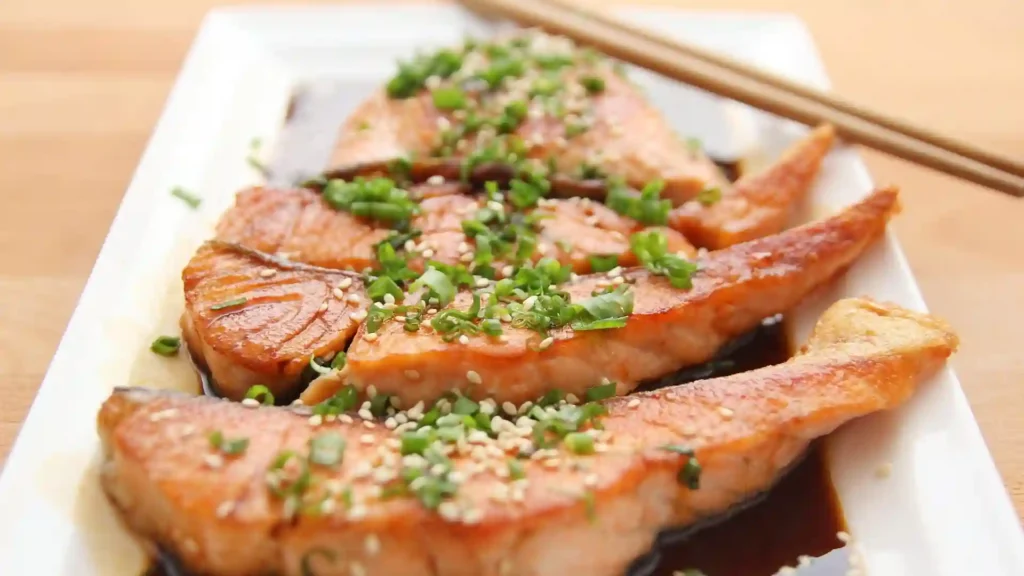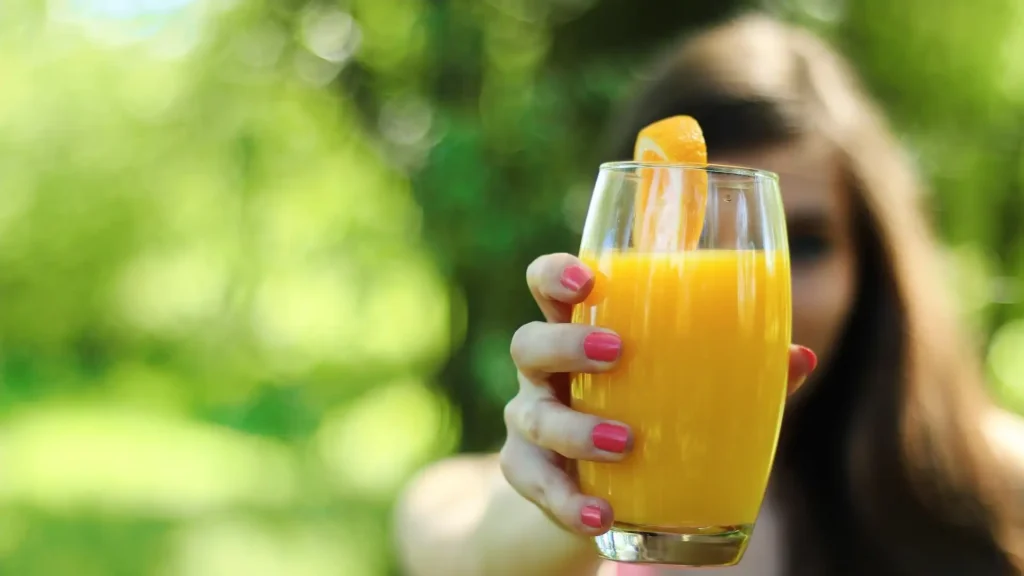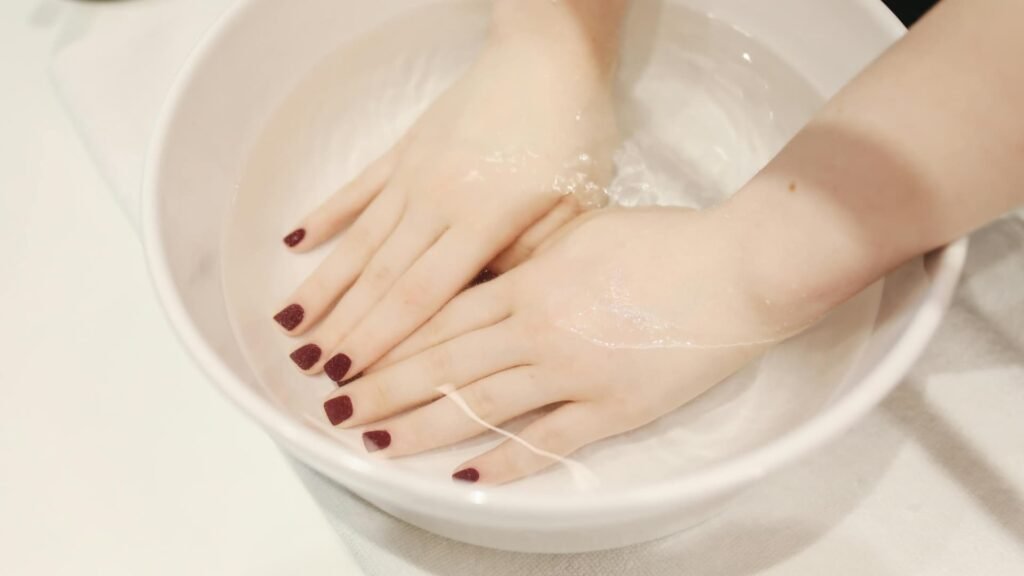The health and beauty of your nails are intricately linked to your overall nutrition, as the body requires a variety of vitamins, minerals, and macronutrients to maintain strong, healthy nails. Just as a balanced diet nourishes your skin, muscles, and hair, it also plays a pivotal role in supporting the growth and resilience of your nails.
Without proper nutrition, nails may become weak, brittle, discolored, or even prone to fungal infections.
Add Biotin into Your Routine
If you want to achieve optimal nail health, focus on nutrient-dense foods that provide a comprehensive range of vitamins and minerals. For example, biotin, a water-soluble B vitamin, is one of the most well-researched nutrients when it comes to nail health.
Biotin-rich foods, such as eggs, almonds, sweet potatoes, and spinach, can support the body’s ability to produce keratin, the main ingredient of nails, and promote overall nail strength. Emily Fernandes, a registered dietitian says, “Incorporating a variety of nutrient-rich foods like leafy greens, nuts, and whole grains can help ensure you’re getting a broad spectrum of vitamins that support both nail and general well-being.”
Biotin, also known as vitamin B7, plays a crucial role in the metabolism of fatty acids and amino acids, which are necessary for the growth and maintenance of healthy nails, hair, and skin. According to Dr. Jennifer L. Gass, a dermatologist and expert in hair and nail disorders, “Biotin is vital for keratin production, the protein that makes up the structure of nails. A deficiency in biotin can lead to thinner nails and slower growth, making it a key nutrient for anyone looking to improve nail health.”
In one notable study published in Dermatology and Therapy, participants who took a daily biotin supplement for 6 months showed a significant improvement in nail thickness and strength. Dr. Gass says, “While a biotin-rich diet can support nail health, those with more severe deficiencies may benefit from targeted supplementation under the guidance of a healthcare provider.”
Biotin works synergistically with other vitamins, particularly vitamin E and zinc, which are essential for collagen synthesis and skin repair. Consuming a variety of foods containing these vitamins, alongside biotin, can enhance the results and provide stronger, healthier nails
“While biotin can be incredibly beneficial, don’t overlook the importance of hydration, proper nail care, and avoiding harsh chemicals, which can also contribute to healthier nails,” says Dr. Rachel Nazarian, a board-certified dermatologist.
Zinc for Healthy Nails
Zinc deficiency can lead to slow nail growth, brittleness, and white spots on the nails. In fact, nails are one of the first areas to show signs of zinc deficiency. According to Dr. Erin Gilbert, a dermatologist and expert in skin health, “Zinc is essential for collagen synthesis and the repair of damaged tissue, which directly impacts the strength and appearance of nails.”
Foods rich in zinc include pumpkin seeds, chickpeas, lentils, oysters, and red meat. Research indicates that incorporating zinc into your diet can support proper cell turnover and accelerate tissue repair, thus promoting healthy nail growth. “Zinc’s role in cellular regeneration means it helps repair damaged nail beds, encouraging faster growth and preventing issues like brittleness,” says Dr. Gilbert.
In a study published in The Journal of Dermatology, participants with zinc-deficient nails saw significant improvements in nail strength and appearance after incorporating zinc-rich foods or supplements into their diet. Zinc supports the immune system, helping to prevent infections that can affect nail health, such as fungal or bacterial nail infections.
For optimal nail growth, it’s essential to maintain a balanced diet that includes not just zinc, but also other vitamins and minerals such as biotin and vitamin E. “When working in combination, these nutrients help maintain the structural integrity of nails and accelerate growth,” says Dr. Bank.
Iron Can Shape Your Nails
Iron contributes to the production of hemoglobin, the protein in red blood cells responsible for carrying oxygen throughout the body, including the nails. Iron deficiency can lead to a range of nail abnormalities, such as thin, spoon-shaped nails (a condition called koilonychia), as well as brittle or pale nails.
Dr. Shari Lipner, a board-certified dermatologist specializing in hair and nail disorders, explains, “Iron deficiency is one of the most common causes of nail problems, as it impairs the body’s ability to produce healthy cells, including those needed for strong nails.”
Good dietary sources of iron include red meat, spinach, beans, fortified cereals, and tofu. The body absorbs two forms of iron: heme iron, found in animal products like red meat, and non-heme iron, found in plant-based foods like legumes and leafy greens. While both forms are important, heme iron is more easily absorbed. However, research shows that pairing non-heme iron-rich foods with a source of vitamin C (such as citrus fruits, bell peppers, or strawberries) can significantly improve iron absorption. According to registered dietitian Keri Gans, “Vitamin C enhances the absorption of plant-based iron by up to four times, which is especially important for individuals following vegetarian or vegan diets.”
Have A Protein Rich Diet
Protein, being a fundamental building block of keratin, is essential for nail health and beauty. Keratin, a tough, fibrous protein, forms the structure of nails, hair, and skin. When the body doesn’t receive enough protein, it can’t produce adequate amounts of keratin, leading to weak, slow-growing nails that are more prone to damage, breakage, and splitting.
Dr. Rachel Nazarian explains, “Protein is the cornerstone of nail health because it is directly involved in the production of keratin. Without enough protein, nails may become fragile and their growth may slow, making them more susceptible to environmental damage.” She adds, “If the body is lacking in protein, the production of keratin will be compromised, leading to weakened nails.”
To ensure an adequate supply of amino acids needed for keratin production, it’s important to include a variety of protein-rich foods in your diet. Lean meats, fish, eggs, and dairy products are excellent sources of high-quality protein that provide all the essential amino acids the body needs.
For those following plant-based diets, protein-rich foods like tofu, lentils, chickpeas, quinoa, and nuts offer an excellent alternative. Registered dietitian Sarah Davidson recommends, “If you’re vegan or vegetarian, it’s important to combine plant-based protein sources, like beans with rice, to ensure you’re getting a complete profile of amino acids.”
For optimal nail health, it’s essential to ensure that your protein intake is adequate and well-rounded. The recommended dietary allowance (RDA) for protein varies depending on age, sex, and activity level, but generally ranges from 46 to 56 grams per day for adults.
Studies have shown that protein deficiencies can lead to several visible signs, including changes in the nails. A study published in the American Journal of Clinical Nutrition found that individuals with low protein intake were more likely to experience nail thinning and abnormal growth patterns, particularly in the form of horizontal ridges or brittleness.
Omega-3 Fatty Acids for Nail Health

Omega-3 fatty acids—which are primarily found in fatty fish like salmon, mackerel, and sardines, as well as plant-based sources such as chia seeds, flaxseeds, and walnuts—help nourish the skin and cuticles surrounding your nails. These healthy fats play a key role in maintaining the integrity of both the nail plate and the surrounding tissues. Regular intake of omega-3s helps preserve moisture, preventing the nails from becoming dry, brittle, or prone to cracking.
“Omega-3 fatty acids are essential for keeping your nails, skin, and cuticles hydrated and nourished,” says Dr. Doris Day, a board-certified dermatologist and clinical associate professor of dermatology. “When the nail bed and surrounding skin are adequately moisturized, nails grow more effectively and are less likely to experience damage from environmental factors.”
One of the primary benefits of omega-3s is their ability to support the flexibility of the nail plate. The nail plate—the hard surface of the nail—is composed of keratin, and omega-3s help maintain its elasticity, ensuring it doesn’t become too rigid or brittle. Dr. Day further explains, “By improving the fluidity of cell membranes, omega-3s help the nail plate stay flexible, preventing cracks and splits that can occur when nails are overly dry or stiff.”
Additionally, omega-3 fatty acids are well known for their anti-inflammatory properties, which can be particularly beneficial for the skin around the nails. Conditions such as hangnails, inflammation, or redness around the cuticle can all be exacerbated by inflammation. Omega-3s help reduce this irritation and promote healing, contributing to a healthier nail growth environment. “The anti-inflammatory action of omega-3s is not only good for your nails but also for the skin that supports them,” says Dr. Day. “This can prevent conditions like painful, inflamed cuticles and allow for smoother, more consistent nail growth.”
There is also evidence that omega-3 fatty acids may help stimulate nail growth. A study published in the Journal of Clinical and Aesthetic Dermatology found that participants who consumed omega-3 supplements over a period of several months experienced an increase in nail growth rate and improved nail thickness. “Omega-3s can help nourish the cells responsible for nail growth,” says Dr. Fernandes. “This can lead to faster, stronger nails that are less likely to peel or break.”
Pay Attention to Your Body’s Special Nutritional Needs
A well-rounded diet that incorporates a variety of these essential nutrients not only promotes healthy nails but also supports the growth of strong, vibrant hair, smooth skin, and overall well-being. It’s important to note that the body’s absorption of these nutrients can be influenced by various factors, such as digestive health, age, and lifestyle choices.
Therefore, paying attention to your body’s specific nutritional needs, as well as ensuring a consistent intake of these vital nutrients, will help ensure that your nails, hair, and skin remain in top condition.
Stay Hydrated
Staying well-hydrated by drinking plenty of water is essential for maintaining the moisture balance in both your skin and nails. Dehydration can cause nails to become brittle and prone to breaking, so it’s important to drink sufficient water throughout the day to keep your nails hydrated from the inside out.




